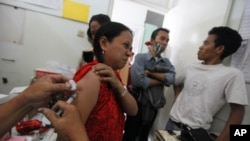A new study finds that combining four tuberculosis drugs into one pill could help fight drug-resistant strains of the disease.
One of the main reasons those strains develop is because many TB patients don't take their medicines as instructed. The World Health Organization's recommended treatment for tuberculosis includes four drugs. Combined in one pill, they are easier to take. But there have been doubts about whether the four-in-one pill is as effective.
In this new research, WHO scientist Christian Lienhardt and colleagues studied how patients responded to the combination pill compared with the drugs in separate pills. TB patients were recruited in 11 countries in Latin America, Africa, and Asia, and divided into two groups. One got the combination pill, the other took the same drugs in individual pills.
Lienhardt's team used three different methods to measure whether different ways of taking the drugs were equally effective. The found the combination pill was slightly less effective. But that might be more than compensated for by the assurance that the patient taking the combination pill is getting all the medicine, not a partial dose that could kill the weaker strains while allowing the more drug-resistant TB bugs to survive.
"It's important to be able to fight and prevent multi-drug resistance, which is really an emerging, and a very high concern for people who take care in the fight against tuberculosis," says Lienhardt. "And the best way to prevent resistance is to make sure that treatment is fully being taken."
The combination pills are already being used in some TB treatment programs, but other programs have avoided them because of concerns about their effectiveness compared with individual pills.
The study was funded by the U.S. Agency for International Development (USAID) which, the authors say, had no role in the conduct of the study or its conclusions.
The paper by Christian Lienhardt of the World Health Organization and his colleagues is published in the Journal of the American Medical Association, JAMA.




